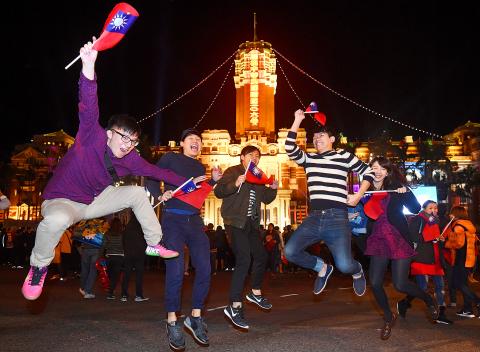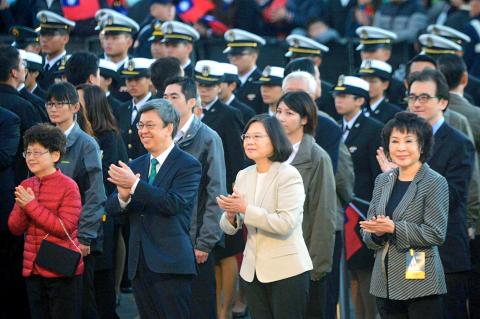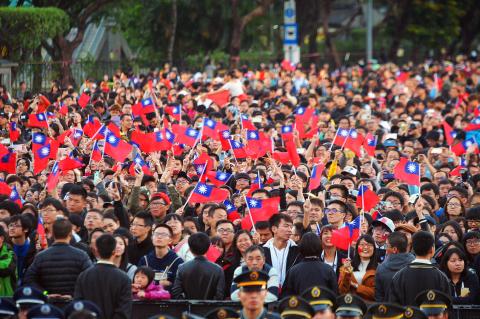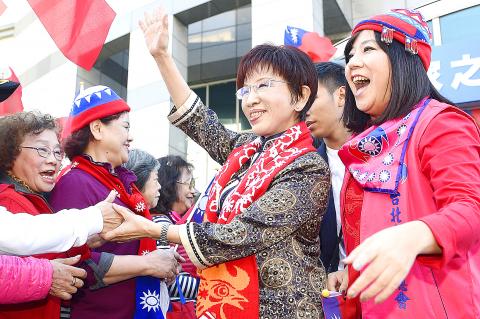In a break with precedent, President Tsai Ing-wen (蔡英文) did not give a New Year’s Day speech yesterday morning, instead marking the occasion by attending a flag-raising ceremony and singing the national anthem along with members of the military.
Tsai and Vice President Chen Chien-jen (陳建仁) left the Presidential Office Building at 6:16am to join the hundreds of people already gathered in front to watch the New Year’s Day flag-raising ceremony, a tradition that has now been observed by four presidents.
As the flag was raised, Tsai and Chen sang the national anthem along with the crowd and 45 soldiers from various units of the armed forces who recently received commendations for their distinguished performances over the past year.

Photo: Liao Chen-huei, Taipei Times
The ceremony was followed by a performance by a group of drummers made up of the Ministry of National Defense Symphony Orchestra and an indie band called Fire Ex, best known for writing a song for the Sunflower movement in 2014.
In past years, following the ceremony, top officials have gathered indoors to hear a speech by the president.
However, this year Tsai set out key areas of policy focus and expressed her hopes for the new year at a news conference on New Year’s Eve.

Photo: CNA
Tsai was celebrating her first New Year’s Day as president.
Former president Ma Ying-jeou (馬英九) attended the ceremony, saying he was there in an informal capacity.
He sang the national anthem and saluted the flag in a spot far from where Tsai and other officials, including Taipei Mayor Ko Wen-je (柯文哲), were standing.

Photo: CNA
Chinese Nationalist Party (KMT) Chairwoman Hung Hsiu-chu (洪秀柱) accepted an invitation to attend the event, but also stood far way from Tsai.
Hung, along with KMT vice chairmen Hau Lung-bin (郝龍斌), Chen Chen-hsiang (陳鎮湘) and Lin Jung-tzer (林政則), later attended a separate flag-raising event held by the KMT in front of its party headquarters in Taipei.
In a speech, Hung said that she “refuses to stand with a government that disregards the law and the Constitution, simply borrowing the shell of a government to take office.”

Photo: Chen Chih-chu, Taipei Times
The sight of a Republic of China flag being raised moves her deeply, she said, adding that the nation has seen both great hardships and prosperity in its 106 years of existence.
“What pains me is that the nation is facing this kind of situation. We apologize to this flag, truly apologize to this flag that has created the Republic of China,” Hung said.
Noting that the word “hardship” was chosen by the public as the word to represent last year, Hung said that the KMT also experienced the hardship of two successive failures.
“We felt distraught and at a loss for morale. We did not know how to face the situation,” Hung said, alluding to the KMT’s failure in the presidential election and its loss of majority in the Legislative Yuan.
Hung said that the KMT was working “for the public” and that it would work toward peaceful relations with China, adding that the party would fight against the government’s proposed lifting of a ban on imports of food products from five Japanese prefectures and would strictly supervise Tsai’s administration.

CARROT AND STICK: While unrelenting in its military threats, China attracted nearly 40,000 Taiwanese to over 400 business events last year Nearly 40,000 Taiwanese last year joined industry events in China, such as conferences and trade fairs, supported by the Chinese government, a study showed yesterday, as Beijing ramps up a charm offensive toward Taipei alongside military pressure. China has long taken a carrot-and-stick approach to Taiwan, threatening it with the prospect of military action while reaching out to those it believes are amenable to Beijing’s point of view. Taiwanese security officials are wary of what they see as Beijing’s influence campaigns to sway public opinion after Taipei and Beijing gradually resumed travel links halted by the COVID-19 pandemic, but the scale of

TRADE: A mandatory declaration of origin for manufactured goods bound for the US is to take effect on May 7 to block China from exploiting Taiwan’s trade channels All products manufactured in Taiwan and exported to the US must include a signed declaration of origin starting on May 7, the Bureau of Foreign Trade announced yesterday. US President Donald Trump on April 2 imposed a 32 percent tariff on imports from Taiwan, but one week later announced a 90-day pause on its implementation. However, a universal 10 percent tariff was immediately applied to most imports from around the world. On April 12, the Trump administration further exempted computers, smartphones and semiconductors from the new tariffs. In response, President William Lai’s (賴清德) administration has introduced a series of countermeasures to support affected

Pope Francis is be laid to rest on Saturday after lying in state for three days in St Peter’s Basilica, where the faithful are expected to flock to pay their respects to history’s first Latin American pontiff. The cardinals met yesterday in the Vatican’s synod hall to chart the next steps before a conclave begins to choose Francis’ successor, as condolences poured in from around the world. According to current norms, the conclave must begin between May 5 and 10. The cardinals set the funeral for Saturday at 10am in St Peter’s Square, to be celebrated by the dean of the College

CROSS-STRAIT: The vast majority of Taiwanese support maintaining the ‘status quo,’ while concern is rising about Beijing’s influence operations More than eight out of 10 Taiwanese reject Beijing’s “one country, two systems” framework for cross-strait relations, according to a survey released by the Mainland Affairs Council (MAC) on Thursday. The MAC’s latest quarterly survey found that 84.4 percent of respondents opposed Beijing’s “one country, two systems” formula for handling cross-strait relations — a figure consistent with past polling. Over the past three years, opposition to the framework has remained high, ranging from a low of 83.6 percent in April 2023 to a peak of 89.6 percent in April last year. In the most recent poll, 82.5 percent also rejected China’s